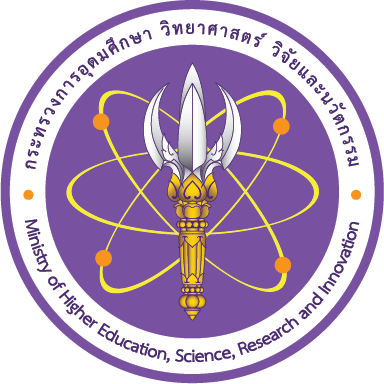As part of NSTDA Annual Conference 2021, Presidents’ Forum 2021 took place on 26 March 2021. This event brought together leaders of scientific and academic institutes from Thailand and overseas to share their perspectives on science, technology and innovation issues. The theme of Presidents’ Forum 2021 was Bio-Circular-Green Economy (BCG): Turning Challenges into Opportunities in the Post-COVID-19 World with four distinguished keynote speakers: Prof. Dr. Chen Chien-Jen, Distinguished Professor Genomics Research Center, Taiwan; Prof. Dr. Hasan Mandal, President, Scientific and Technological Research Council of Turkey (TÜBITAK), Turkey; Prof. Joachim von Braun, Director, Center for Development Research (ZEF), Germany; and Prof. Emeritus Dr. Kraisid Tontisirin, Former Director of Food and Nutrition Division, the Food and Agriculture Organization of the United Nations (FAO). Approximately 150 participants from 10 countries attended the online forum.

The forum kicked off with remarks from NSTDA President Dr. Narong Sirilertworakul highlighting on Thailand’s BCG economy model which has recently been declared the national agenda to drive the SDGs. Thailand’s BCG strategic plan consists of four areas: 1) promote sustainability of biological resources, 2) strengthen communities and grassroots economy, 3) enhance competitiveness of Thai BCG industries and 4) build resilience to global changes.

In his keynote speech, Prof. Chen Chien-Jen attributed Taiwan’s successful COVID-19 management to prudent action, rapid response, early deployment, and transparency. Smart technology, including information and communication technology (ICT), artificial intelligence (AI) and big data, has been employed in various aspects such as the disease surveillance and monitoring system, border control, tracking system and even providing care and support services for people under quarantine and self-isolation. The government’s consolidated action on mask production enabled Taiwan to have enough masks for its citizen and surplus to donate to its allies. Prof. Chen concluded his speech emphasizing on the importance of worldwide distribution of vaccines for the elimination of COVID-19 and global solidarity as being the key for the prevention and control of future pandemics.
Prof. Dr. Hasan Mandal shared TÜBİTAK’s strategic approach to S&T support that is now focusing on co-creation model as well as impact of research outputs, with a particular emphasis on sustainable development. The co-creation model has been applied to research and human resource development, with examples such as the European Green Deal, Industry Doctorate Program and the COVID-19 Turkey Platform which funded 17 vaccine and drug development projects involving 436 researchers from 49 institutes. Prof. Mandal added that the co-creation model can be applied to support SDG 12 responsible consumption and production as he pointed out an increase in the use of natural resources and electronic waste in the past decade. Circular economy transformation requires support from multiple disciplines engaging multiple sectors which can be achieved through the co-creation model.
In his talk, Prof. Joachim von Braun explained that bioeconomy is a strategy that involves both producers and consumers and serves as an industrial transformative force that provides advancement to sustainable development, launches innovative startups and accelerate sustainable job creation. He concluded his talk with five recommended actions for policy development derived from the Global Bioeconomy Summit 2020, 1) capitalize on the power of S&T, 2) foster job creation through partnership and innovation, 3) increase involvement of businesses and industry, 4) promote resilient value chain and 5) transform agri-food system with circular, green, bioeconomy concept.
Dr. Kraisid Tontisirin emphasized the need to transform food and agriculture sector to support the Sustainable Development Goals (SDGs), particularly Goal 2 on zero hunger, and other related goals such as no poverty, good health and well-being, quality education, responsible consumption and production and climate action. He shared with audience Thailand’s Strategic Framework for Food Management that focuses on food & nutrition security, economic opportunity, environmental sustainability and social, culture & tourism through 4 actions: Food Security, Food Quality and Safety, Food Research and Education and Food Management. Connections between Food and Agriculture to BCG, Sufficiency Economy Philosophy (SEP), SDGs and STI were explained. He drew a conclusion on key success factors as comprising human resource development, management of food and agriculture throughout the chain for high productivity and value-added products, effective and adequate investments, and the support of science, technology, research and innovation.
Moderated by NSTDA Executive Vice President Prof. Prasit Palittapongarnpim, the discussion session involved questions and comments on a number of issues, including the importance of inter-ministerial collaboration to drive BCG actions, funding schemes available for BCG research in each country, global solidarity actions to fight the pandemic through frameworks such as the WHO and APEC, international initiatives to promote circular economy such as the European Green Deal and the Southeast Asia-Europe Joint Funding Scheme for Research and Innovation, the volatility of agricultural sector and S&T as solutions to stabilize this sector, the gap between healthy diet demand and high starch/sugar supply, alternative proteins and the role of carbon capture in BCG.
In his closing remarks, Dr. Narong thanked speakers and participants and summarized key messages arising from the forum: the need for strong commitment to sustainable development at all levels, the important role of human resource, knowledge sharing and networking of people/sectors across the nations and harmony in collaboration. He reaffirmed NSTDA’s commitment to global sustainability through BCG actions.
Download Presidents’ Forum 2021 Book
View a full recording of Presidents’ Forum 2021: https://youtu.be/9VSV4xhTdO8








